Vince Gilligan interview: Breaking Bad 10 years on
The Breaking Bad creator reflects with Den Of Geek on his experience of making the acclaimed Bryan Cranston-starring drama a decade on...
The opening of Live Free Or Die, the first episode of the fifth season of Vince Gilligan’s transformative crime drama Breaking Bad, opens with a close-up of a plate of breakfast on the counter of a diner. Some hands, the hands of chemistry teacher turned crystal meth kingpin Walter White, reach into frame and begin to disturb and rearrange the food.
This shot is held, unbroken, for 20 seconds. It’s part of a pre-credits sequence that lasts for four and half minutes and is made up of just 26 cuts.
There was significant anticipation amongst viewers and critics ahead of the fifth season of Breaking Bad. The episode aired on the 15th of July 2012, almost nine months after the season four finale. The fourth season had ended so dramatically and was so lauded that it seemed impossible that the fifth season could meet expectations.
They opened on a plate of bacon and eggs.
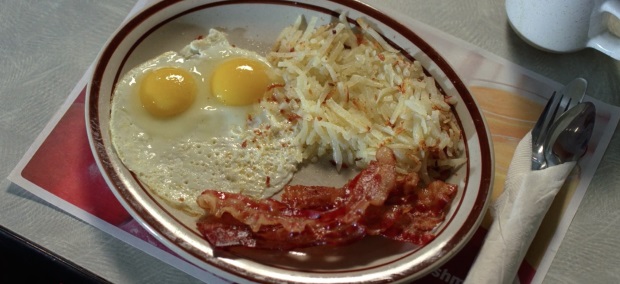
The scene that follows is engrossing, compelling viewing. It’s a masterpiece of minimalism and precision. Every word is carefully placed yet there’s no rigidity to it. Breaking Bad had never felt more assured.
Breaking Bad is a work that exudes confidence.
That is a notion that tickles creator Vince Gilligan.
“I love that we pulled one over on the world. I really am the least confident person you’ll ever interview.”
It has been ten years since Breaking Bad first aired. Creator Vince Gilligan is in London and, prior to seeing Breaking Bad star Bryan Cranston in a West End play, he takes some time to talk to us about his show and its legacy. He’s laid back, reassuringly calm with a soft, southern tone to his voice. He thinks about the questions we ask him and then gives long answers, exploring the ideas and pulling us along on diversions as he does (“I’m sorry Matt, I’m getting off on a ramble”).
“I had six or seven of the smartest people I could find surrounding me and we were blessed with the right amount of lead time from our network, from Sony and AMC. Therefore, because I lack confidence, we had the time to triple check that our ideas were sound, that our storytelling was solid, that we’re building on terra firma. Constructing the structure of our story, we had time to really think it through.”
“In fact, the general lack of confidence, I feel, made me strive to dot all the i’s and cross all the t’s and build a better structure story-wise.”
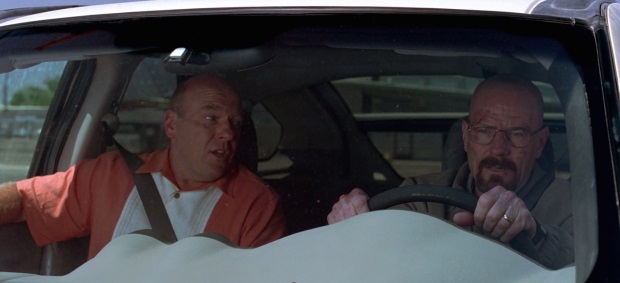
“Sometimes confidence can lead you to accept the first decent idea instead of to really strive to even discard that and go for the ultimate great idea. So in a weird way, I think confidence is overrated sometimes. Lack of confidence can actually get you farther if you have the right amount of time and the right tools and the right people helping you. But I love the fact that it feels like a confident show from afar, from a viewer’s point of view.”
Time to work is a rare commodity in television. Whether by chance (the first season was truncated due to a writer’s strike) or design (the fifth season was allowed to run in two sets of eight episodes a year apart), Gilligan and the team behind Breaking Bad did have time to refine their show.
Talking to Gilligan now, it becomes apparent that perhaps this time also amounted to an extended period of torture.
“I’m a very neurotic person, I literally thought at every turn it’d be cancelled. I never thought it’d even be on the air. When it was on the air for a few years I thought ‘Well, we’re gonna be cancelled any day now’.”
“When in fact the show became very, very popular, I got more and more nervous. You would hope in a moment like that you’d say ‘God, all this hard work, and blood, sweat and tears, and finally people are seeing the show for what it is! Hoorah! And, even if I don’t rest easy, now I can enjoy the fruits of those labours.’ No. In that moment, maybe you just double down. You say ‘Oh my God. What just happened? This is insane. I’m even more nervous now than I was before!’”
In Breaking Bad, Gilligan’s protagonist Walter White (deftly brought to life by Bryan Cranston) serves as our entry point into the underworld, a labyrinthine society weaved into the threading of the normal workaday world of Albuquerque, New Mexico. Whether it’s a house on a suburban street with a body dissolving in a bathtub, a fast food restaurant run by a ruthless drug lord or a car wash laundering millions of dollars earned from manufacturing crystal meth, we find that there’s another far grimmer reality around us, hinted at in the details of our day-to-day lives.

Gilligan’s show is rich in detail. The plotting is meticulous, with story elements sown with such subtlety that the skill in the planning only becomes clear on a second watch.
The quality of story, richness of character and authenticity of environment creates a world that feels fully developed and real, one that is constantly expanded with similar care. But how is that manageable for the writers? Is Gilligan just able to summon all that’s come before?
“No, I wish. My brain, the older I get it holds even less. There’s not the capacity I would wish there to be. We were good historians of our show. We had seven writers of our show, including myself, and one of us could be counted on to remember a particular detail, but not all of. All of us, as individuals, couldn’t carry it all in our heads, but between the seven of us. Honestly our wonderful writers’ assistant who was in the room with us taking notes, usually it was that person who remembered things better than we did.”
“Between the seven of us plus our writers’ assistant, someone was bound to remember a certain detail, a certain small element, even if only in a vague passing way. If someone would say ‘Hey, didn’t Walt at one point mention, in passing, a certain da da da da?’ And then we would look it up, and then we would say ‘you know what, I think we can use that’.”
Breaking Bad, then, was less the product of a brash superstar with a superhuman ability to write than it was craftsmanship, time, hard work and good administration.
“We get a lot of credit for this detail rich, very faithful unto itself sort of storytelling shape for the entire run of episodes. It was never because we had a master plan from the get go. It’s because we would be very careful to mine past episodes and hew to them faithfully in terms of plot details, and therefore make the whole thing feel like it was of a piece. We were looking backward not forward half the time, in other words.”
“We were so lucky for it to happen when it did, because before binge watching and before Netflix we figured, we want really smart people watching the show. We want them to watch closely and pay strict attention. And why would they do that unless they’re being rewarded with internal logical consistency and with these little Easter eggs, these little details that if you watch closely you get rewarded for?”
If increasing our understanding of the creative team behind Breaking Bad helps us make sense of their achievement, it makes it all the more striking that their process so often resulted in stories with tragic and violent conclusions.
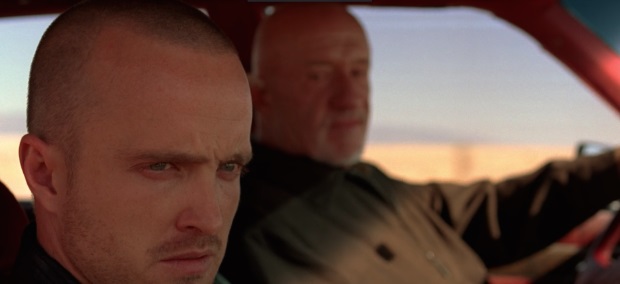
Consider Walter White’s protégé Jesse (played with electric energy by Aaron Paul), who endures extended periods of deep suffering. Think about the tremendous acts of violence on the show, often towards characters we’ve formed a bond with. The merciless slaying of Hank (the wonderful Dean Norris), for example, feels brutally unfair. These are acts the team behind the show have lived in and have pored over.
“You know, we never did cruelty for cruelty’s sake and we never showed violence for violence’s sake.” Gilligan explains. Even still, talking to him, it’s hard to imagine that the considered creative process of this man could result in art that is so brutally violent.
“It’s funny, people all the time when they talk to me, they hear that I say to folks, I can’t watch this and so because it’s so violent, and people say ‘My God, you’re the guy who created Breaking Bad, are you serious?’”
“I had a really hard time, for instance, there was a scene in Breaking Bad where Gus Fring cuts the throat of one of his henchmen. It’s a very gory, very bloody, very hard to watch scene, and I had to watch it over and over again. I didn’t direct that scene, but I think I was the one who wrote the episode. I can’t remember now, they all run together in my head. But when the dailies came in, I thought, ‘Oh my God. Thank God this looks so real. This is what I asked for, but God this is hard to watch’ And then I had to watch it over and over again in the editing room and then in the mix stage, and at a certain point, I just would avert my eye.”
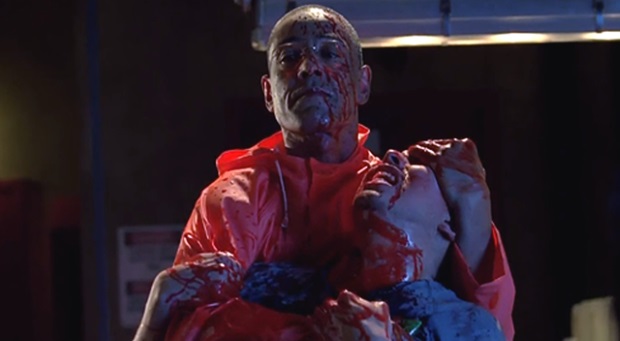
“All these things, the cruelty, the violence, we felt a need, more than a need, I felt an obligation to get them right. I didn’t want anything in the show to be cartoony. And it stands to reason, at least to my way of thinking, that if you’re gonna get yourself into the meth business, if you’re gonna become that person, you’re gonna pay some heavy penalties for it. You’re gonna do things and witness things that are awful, that right minded people should do their best to avoid in real life. But if you’re gonna live that life this is what you’re gonna get.”
“I’m a big fan of The Three Stooges, which is slapstick, unrealistic violence, The Three Stooges gets a pass from me, but in shows and movies where there’s violence but it’s presented as not having consequences, where it looks real, where the blood looks like blood and it flows copiously but there’s no real emotional consequences, that to me always feels a little bit, ahh, what’s the word? It feels, I don’t want to say immoral, that’s too strong a word, but it feels dangerous. It feels dangerous to me.”
“But my point is, we felt a need to hit a lot of the stuff head on and make it as realistic as possible and, more importantly than that, always have it yield consequences. Understandable, believable and very often negative consequences. Because to do otherwise felt unearned and it felt reckless.”
“Better to make the world seem more realistic in the consequences of these bad choices Walter White makes throughout the run of the series.”
Ah, Walter White and his bad choices.
If you were to explain Breaking Bad to your friends, you might tell them it’s about a chemistry teacher who, facing a cancer diagnosis, starts making crystal meth to raise money for his treatment and to set his family up in case he doesn’t survive.
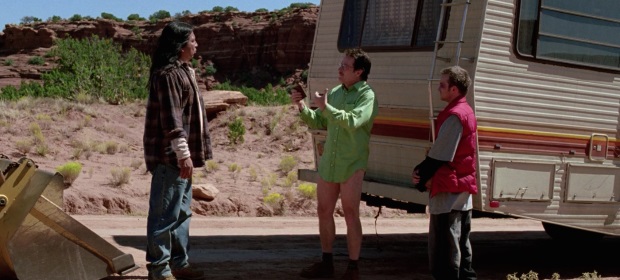
White often recites that he’s doing it for his family. It becomes a mantra for the character, something that he wields as a weapon even as it becomes increasingly detached from his actions. White’s true drive, the thing that emboldens him to take incredible risks in the face of jaw-dropping violence and extreme danger to everyone around him in pursuit of outlandish wealth, lies elsewhere.
“You know, it dawned on all of us kind of slowly. The pride and the ego that that man possessed. It was really interesting how some of those elements, or rather our understanding and realisation of those elements, came much later. That’s why I love television storytelling; you learn things throughout the whole time you’re writing a TV show, if you allow yourself to. And also, it’s so great to have fellow writers with you.”
“When I created the pilot for Breaking Bad, Walter White was just a poor shlub who needed money and therefore he did this terrible thing, which was to cook meth. But he really was morally defensible. He’s basically an uncomplicated man, he needed money so therefore he made this decision. As the show progressed and working with these writers I came to realise, there’s got to be more to it than that. He’s got to be complicated. What is it that drives a man like this?”
“His ego, and I didn’t see it coming, I didn’t see it on day one, but it really becomes one of the most important elements of the story. And the ego I think hides a great deal of damage and low self esteem that’s just below the surface.”

As in the quotes above, Gilligan references his writers throughout our interview. The people who built the show with him, the people who triple checked with him, the people who dotted the i’s with him. The people who discovered Walter White’s ego with him. The people who remembered what had happened and who would remember how it felt, even ten years on.
“It was wonderful. It was the best job I’ve ever had or will ever have. Having said that, if you had seen me in the midst of production, you would have seen me pacing around and grumbling, griping to myself. I almost wish my writers were here because they would start laughing. As soon I said it was a great job they’d start laughing because I was griping all the time in the writer’s room. I’d say ‘Oh God, can’t we just end this?’ I was like the quote unquote tortured artist running around. I would literally bang my head against a wall sometimes just to try to knock the ideas loose inside.”
“But you know, very often when people ask me do I like writing in general, I always say I like having written, past tense. For the folks who were there in the midst of it with me, they’d probably say to me ‘you’re remembering things a bit through rose coloured glasses’. I just wish I had enjoyed it a bit more than I did when it was going on, because it truly was such a blessing to have that job.”
Breaking Bad is out now on DVD, Blu-ray and Download